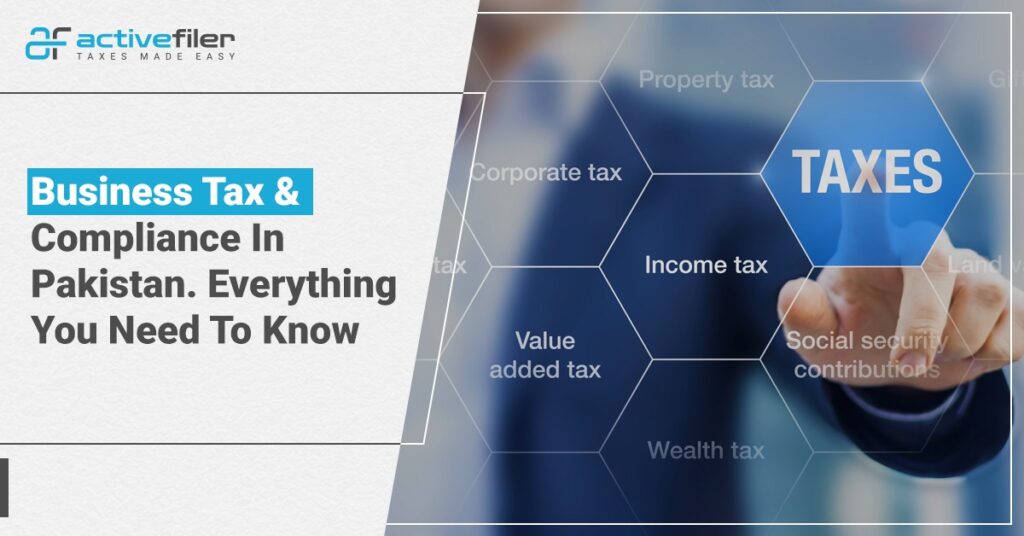Running a business in any country has many tax requirements. In Pakistan, multiple taxes apply to business transactions based on their nature. FBR, the Federal Board of Revenue, is an official tax collection and regulatory body in Pakistan which takes care of all the policies surrounding taxes on personal and corporate income streams, custom duties, and sales taxes. While the taxes on services are collected by the province individually, and these provincial tax regulating bodies include the following –
- Sindh Revenue Board
- Punjab Revenue Authority
- KPK Revenue Authority
- Baluchistan Revenue Authority
However, the sales tax collection on services within the territory of Islamabad Capital comes under FBR.
The central two taxes every business in Pakistan are subjected to include income and sales taxes. They are collected and regulated under the Income Tax Ordinance 2001 and the Sales Tax Act 1990, respectively. While the sales tax on services is governed by the laws and policies formulated by provincial taxing bodies. The tax year in Pakistan begins on July 1st and lasts till June 30th. However, the government of the time may announce a different tenure as a tax year, but that would be called a special tax year and not the usual.
Income Taxes Implied on the Businesses in Pakistan
Here’s the detailed information on income taxes applied on each different type of business run in Pakistan –
Business Individuals or Sole Proprietor –
Sole Proprietorship is one of the widespread business models in Pakistan. It is an unincorporated business run and owned by a single individual, meaning all the profits, losses, and liabilities belong to only that individual.
The income tax slabs for sole proprietorship businesses run in Pakistan can be listed as follows –
| Taxable Income | Rate of Tax |
| Below 600,000 | 0% |
| 600,000 – 800,000 | 5% of the amount above 600,000 |
| 800,000 – 1,200,000 | Rs. 10,000 + 12.5% of the amount above 800,000 |
| 1,200,000 – 2,400,000 | Rs. 60,000 + 17.5% of the amount above 1,200,000 |
| 2,400,000 – 3,000,000 | Rs. 270,000 + 22.5% of the amount above 2,400,000 |
| 3,000,000 – 4,000,000 | Rs. 405,000 + 27.5% of the amount above 3,000,000 |
| 4,000,000 – 6,000,000 | Rs. 680,000 + 32.5% of the amount above 4,000,000 |
| Above 6,000,000 | Rs. 1,330,000 + 35% of the amount above 6,000,000 |
Partnership Businesses –
Partnerships are another popular business model in Pakistan. It is also considered a pass-through entity for taxing purposes meaning the partners do not have to pay taxes in collaboration. Instead, each partner must pay taxes for their share of profits and losses incurred from the business. The income slabs and tax percentages for the partnership model are similar, as stated above, for sole proprietorships.
Corporate Taxes in Pakistan –
A resident company in Pakistan is taxed based on its income globally. While the non-resident companies are only taxed based on their income from Pakistani sources. The rates of corporate taxes for the year 2022 and onwards can be seen as follows –
| Company Type | Rate of Tax % | ||
| 2022 | 2023 | 2024 and onwards | |
| Banking Company | 35 | 39 | 39 |
| Public Company | 29 | 29 | 29 |
| Other Companies | 29 | 29 | 29 |
| Small Companies | 21 | 20 | 20 |
Sales Taxes Implied on the Businesses in Pakistan
In Pakistan, the General Sales Tax (GST) is a major indirect tax applied to a wide variety of goods and services per the Sales Tax Act of 1990. The Goods and Services Tax (GST) is a variation of the Value Added Tax (VAT) that levies tax on the increase in value created by a firm at each transaction stage. Services are likewise subject to a sales tax in Pakistan. But different provinces levy and collect it in line with their laws.
Products’ prices typically include a 17% sales tax unless they are specifically excluded or subject to a lower rate.
The Islamabad Capital Territory, Gilgit-Baltistan, Azad Jammu, Kashmir, and the rest of the country all charge between 13 and 16 percent value-added tax on services. The government has mandated cheap rates for several services. In the case of a rate drop, an input tax credit is often not allowed.
The Tax Compliance Schedule in Pakistan
The dates and frequency of tax compliance to be followed in Pakistan can be described as follows –
| Tax Description | Due Date | Frequency |
| Income Tax Return for Sole Proprietors/Individuals/Partnerships | 30th September | Annual |
| Income Tax Withholding Statements | 20th of a month after each quarter ends | Quarterly |
| Annual Withholding Tax Statements (Salaries Only) | 31st July | Annual |
| Annual Withholding Tax Statements (Other than Salaries) | 30th July | Annual |
| Monthly Sales Tax Returns | 15th of the upcoming month | Monthly |
| Annual Sales Tax Returns (for companies only) | 30th September of the upcoming financial year | Annual |
Get Your Business Taxes Sorted with Active Filer
Suppose you are running a business in Pakistan and need assistance with tax filing and compliance. In that case, Active Filer is a professional accounting firm aimed at helping both individuals and businesses manage their taxes at best and get the most as tax returns. Get in touch with our representative today to get your taxes sorted without hassle!




